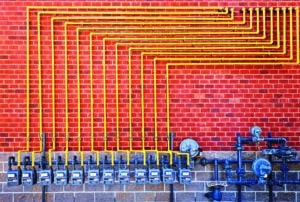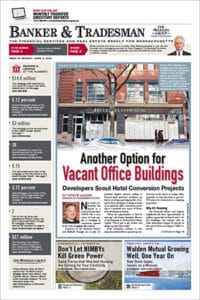
State research shows heavy state subsidies are still needed to make all-electric construction competitive with natural gas-fueled multifamily building systems.
Just as badly needed new apartment projects start to face some serious headwinds, here come the natural gas bans, courtesy of the state’s sweeping new climate change law.
A controversial and freshly inked state pilot program could potentially see several suburbs and cities bar natural gas hookups in new apartment and condo buildings.
A big issue, and one not particularly well covered in the local media, has been the serious concern that banning natural gas hookups could drive up the cost of construction – and hence rents – at desperately needed new apartment buildings.
It was this provision that Gov. Charlie Baker balked at before eventually signing the climate bill, saying it gave him “agita,” given the potentially negative impact on new multifamily construction in Cambridge, Newton and other communities seeking to ban new gas hookups.
Well, if he was feeling the burn before, Baker has got to be downing Tums and other antiacids like mad to deal with an epic case of heartburn following Boston Mayor Michelle Wu’s announcement, after the law passed, that she wants her city to take part in the program, too.
Boston was not part of the group of 10 communities that have already expressed interest in joining, a group that includes Cambridge and upscale suburbs like Newton, Concord and Lexington.
But Boston’s push to muscle in on the program is only likely to escalate concerns over the impact going cold turkey on new gas hookups will have on apartment construction.
After all, Boston alone produces a large chunk of all the apartments built each year in Massachusetts. Now add in Cambridge, Brookline and other suburbs, and that number grows even larger.
What had been billed by supporters as a relatively modest experiment is starting to suddenly look like a behemoth.
Limited Data for Larger Multifamilies
Supporters of banning natural gas hookups have touted a state study showing new, new all-electric residential housing can be competitive with gas, with heavy Mass Save subsidies covering the 10 to 20 percent increase in cost in construction.
But that study only looked at single-family and homes and apartment buildings with six or fewer units.
Developers are concerned about the impact on larger multifamily projects, and rightfully so.
There is a paucity of research on what forced electrification would mean for the cost of building say, a 50-unit apartment building, let alone a 100- or 200-unit project.
And would-be builders of new rental projects are already facing serious headwinds, with surging construction costs and rising interest rates having already put some proposals on ice.
After a big dip amid surging inflation and high economic anxiety in April and May, permits issued for new apartment and condominium projects bounced back a bit in June, federal stats show.
But the overall volume of new multifamily construction – as it has for years – remains far below what’s needed to meet current demand, let alone bring down rents.
Meanwhile, rents show no signs of flattening out, let alone declining, putting unbearable pressure on middle- and working-class families looking for a place to call home.
Too Far, Too Fast
No one is arguing that natural gas should be left alone – eventually it is going to either have to be phased out or replaced by more climate-friendly green hydrogen when and if that technology matures.

Scott Van Voorhis
But Massachusetts last year passed a major update to its stretch energy code aimed at boosting the energy efficiency of buildings old and new, with Boston in the middle now if its own, ambitious effort.
Jumping right to natural gas bans threatens to heap additional complexities and costs onto new apartment buildings as warning signs mount – even as Wu’s administration promises to work with developers when crafting its local gas ban regulations.
Too often, the more zealous supporters of an immediate ban on new gas hookups brush aside the upfront costs and potential impact on new construction.
However, it is a concern the gas banners, clustered as it would seem in affluent suburbs where housing costs are astronomical and where renters are not always welcomed with open arms, would be wise to acknowledge.
Scott Van Voorhis is Banker & Tradesman’s columnist; opinions expressed are his own. He may be reached at sbvanvoorhis@hotmail.com.





